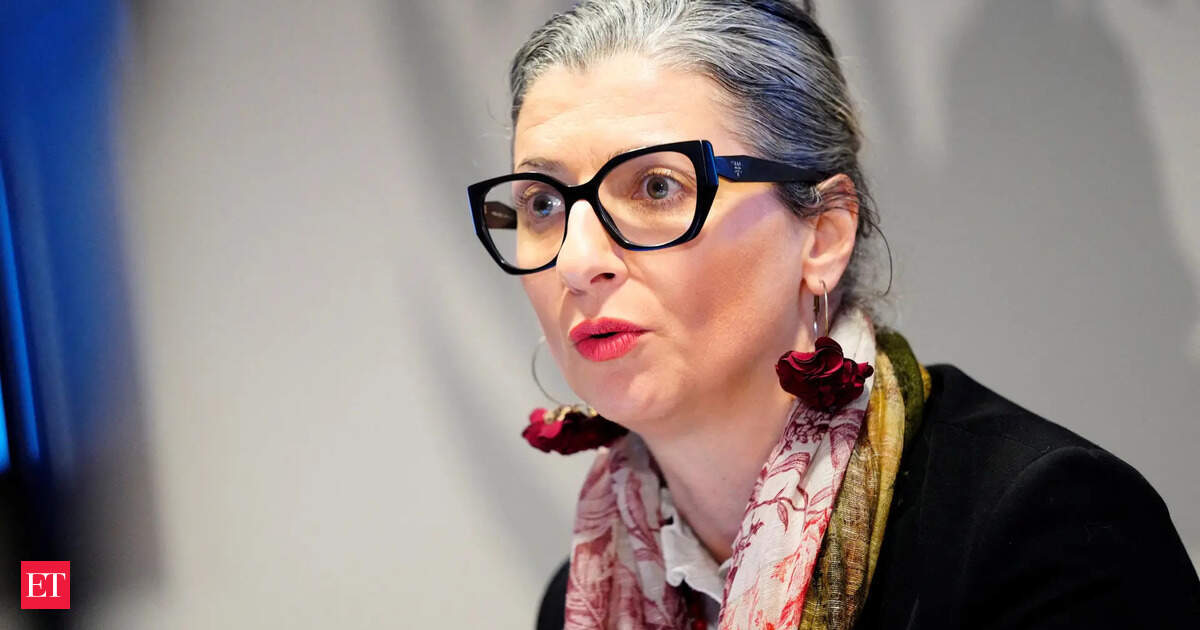In her July 1, 2025, report, Albanese accused Israel of committing acts that constitute genocide in Gaza. The report named over 60 international companies, including arms manufacturers, tech firms, and financial institutions, that she alleges are complicit in enabling Israeli military operations and settlement expansion.
Also Read: Johnson Amendment defanged? Trump backs IRS on places of worship backing political leaders
She urged these companies to end their involvement and called for legal accountability of their executives under international law.
Her report stated: “While life in Gaza is being obliterated and the West Bank is under escalating assault, this report shows why Israel’s genocide continues: because it is lucrative for many.”
Who is Francesca Albanese?
Francesca Albanese is an Italian lawyer, academic, and internationally recognised expert on human rights, particularly in the context of forced displacement and the Israeli-Palestinian conflict. Born in Ariano Irpino in southern Italy, Albanese holds a law degree with honours from the University of Pisa and a Master of Laws in human rights from SOAS, University of London.
Over the course of a decade, she worked with the United Nations, including the Office of the High Commissioner for Human Rights and the UN Relief and Works Agency for Palestine Refugees (UNRWA), advising on human rights norms and protections across the Middle East, North Africa, and Asia-Pacific regions.
Her work has focused especially on refugees and migrants.
Currently, she serves as an Affiliate Scholar at Georgetown University’s Institute for the Study of International Migration and is a senior advisor on migration and displacement at the Arab Renaissance for Democracy and Development (ARDD), where she also co-founded the Global Network on the Question of Palestine.
Albanese is the co-author, alongside Lex Takkenberg, of Palestinian Refugees in International Law (Oxford University Press, 2020), a widely cited legal reference.
She frequently lectures on international law and forced displacement in both Arab and European universities and regularly participates in public debates and conferences on the Israeli-Palestinian conflict.
In 2023, she received the International Stefano Chiarini Award for her reporting on the Middle East. She was named PassBlue’s UN Person of the Year in 2024 and received the Dries van Agt Prize in 2025 from The Rights Forum for her advocacy on human rights in Palestine.
Albanese has faced criticism over claims about her legal title, with some detractors accusing her of misrepresenting her credentials.
In a May 2025 interview, she clarified that while she holds a degree in law, she chose not to take the bar examination in Italy as her interest was in human rights rather than courtroom practice.
She is married to Massimiliano Calì, a World Bank economist, and the couple has two children.
Remarks on the Gaza Conflict
Albanese’s sharpest criticisms came in the context of the Israel-Gaza conflict, which began on October 7, 2023, after Hamas militants killed around 1,200 Israelis and took more than 250 hostages.
In response, Israel launched a large-scale military campaign in Gaza that, according to the territory’s Health Ministry, has killed over 57,000 Palestinians, most of them women and children, though it does not distinguish between fighters and civilians.
Speaking to media outlets including The World with Yalda Hakim, Albanese described the situation as “an assault against civilians,” and highlighted the mental trauma among youth in Gaza.
In a social media post in June, she alleged that torture and sexual violence against Palestinian prisoners have become “widespread and systematic” since the war began. She wrote, “This is not just cruelty: inflicting severe physical or mental harm on members of a group, as such’ is a constitutive element of genocide.”
US response
Although Albanese’s views are her own and do not represent official UN policy, her work has drawn strong reactions. Secretary of State Marco Rubio cited her support for ICC arrest warrants against Israeli leaders, including Prime Minister Benjamin Netanyahu, and her criticism of US foreign policy as grounds for the sanctions. The US had previously attempted to remove her from her UN position but was unsuccessful.
This move follows earlier Trump-era policies to disengage from international institutions seen as critical of Israel.
The administration had already withdrawn from the UN Human Rights Council, suspended funding to several UN agencies, and sanctioned four ICC judges for pursuing investigations against Israel and the US.
Pushback from Rights Groups
The US sanctions against Albanese have been widely condemned by human rights organizations. Amnesty International and other watchdogs have called it a direct attack on the independence of UN mandate holders.
Agnes Callamard, Amnesty’s Secretary General and herself a former UN special rapporteur, said governments must work to “protect the work and independence of Special Rapporteurs.”

